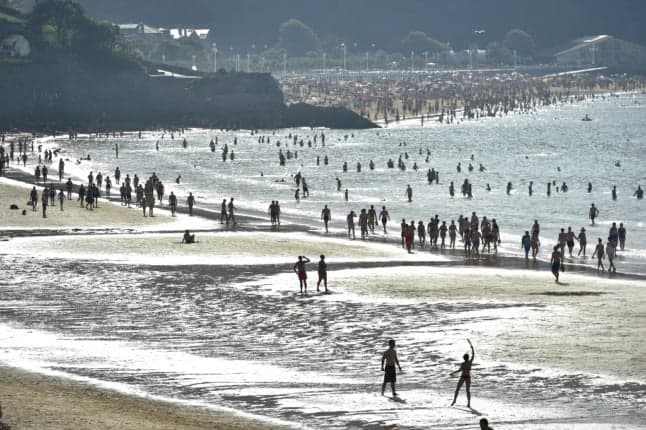Climate crisis: Spain records hottest year in 2020

Spain marked its hottest year in recorded history last year, according to Spain's environment ministry on Friday.
Just a day after the Spanish parliament passed a key national climate-change law, the environment ministry revealed that Spain experienced the highest temperatures in 2020 since records began.
Extreme weather and heatwaves contributed to the change with Spain's average temperatures hitting 14.8 degrees celsius. That's around 1.7 degrees hotter than the average in pre-industrial times, according to the ministry's report.
The study comes after last year's climate study by the European Union and the United Nations, which stated that 2019 was Europe's hottest year in history.
ANALYSIS: Should Madrid be declared a disaster zone as true cost of storm damage emerges?
Seven of the 10 hottest years in Spain took place over the last decade, according to the government document. By the end of the century, there could be an average rise in temperature of as much as 5 degrees above the pre-industrial average, warned the ministry.
Despite the environmental benefits of last year's Covid-19 restrictions, the amount of greenhouse gases also reached unseen highs, revealed the report.
"Extreme meteorological events of this type cost our country around 700 lives and 900 million euros a year," the ministry said.
Spain was blighted by heatwaves last year - three in total - and also experienced severe weather events, such as Storm Gloria, which claimed a total of 13 lives and saw a new peak in rainfall levels across the country's eastern and southern coastlines.
The Prime Minister, Pedro Sanchez, pinned the storm on climate change, claiming the storms were becoming “more and more destructive”.
Spain's first climate change law, approved on Thursday, aims to reduce emissions and achieve carbon neutrality by 2050. However, the targets will be revised in 2023 following criticisms from the left that the goals aimed too low.
Comments
See Also
Just a day after the Spanish parliament passed a key national climate-change law, the environment ministry revealed that Spain experienced the highest temperatures in 2020 since records began.
Extreme weather and heatwaves contributed to the change with Spain's average temperatures hitting 14.8 degrees celsius. That's around 1.7 degrees hotter than the average in pre-industrial times, according to the ministry's report.
The study comes after last year's climate study by the European Union and the United Nations, which stated that 2019 was Europe's hottest year in history.
ANALYSIS: Should Madrid be declared a disaster zone as true cost of storm damage emerges?
Seven of the 10 hottest years in Spain took place over the last decade, according to the government document. By the end of the century, there could be an average rise in temperature of as much as 5 degrees above the pre-industrial average, warned the ministry.
Despite the environmental benefits of last year's Covid-19 restrictions, the amount of greenhouse gases also reached unseen highs, revealed the report.
"Extreme meteorological events of this type cost our country around 700 lives and 900 million euros a year," the ministry said.
Spain was blighted by heatwaves last year - three in total - and also experienced severe weather events, such as Storm Gloria, which claimed a total of 13 lives and saw a new peak in rainfall levels across the country's eastern and southern coastlines.
The Prime Minister, Pedro Sanchez, pinned the storm on climate change, claiming the storms were becoming “more and more destructive”.
Spain's first climate change law, approved on Thursday, aims to reduce emissions and achieve carbon neutrality by 2050. However, the targets will be revised in 2023 following criticisms from the left that the goals aimed too low.
Join the conversation in our comments section below. Share your own views and experience and if you have a question or suggestion for our journalists then email us at [email protected].
Please keep comments civil, constructive and on topic – and make sure to read our terms of use before getting involved.
Please log in here to leave a comment.